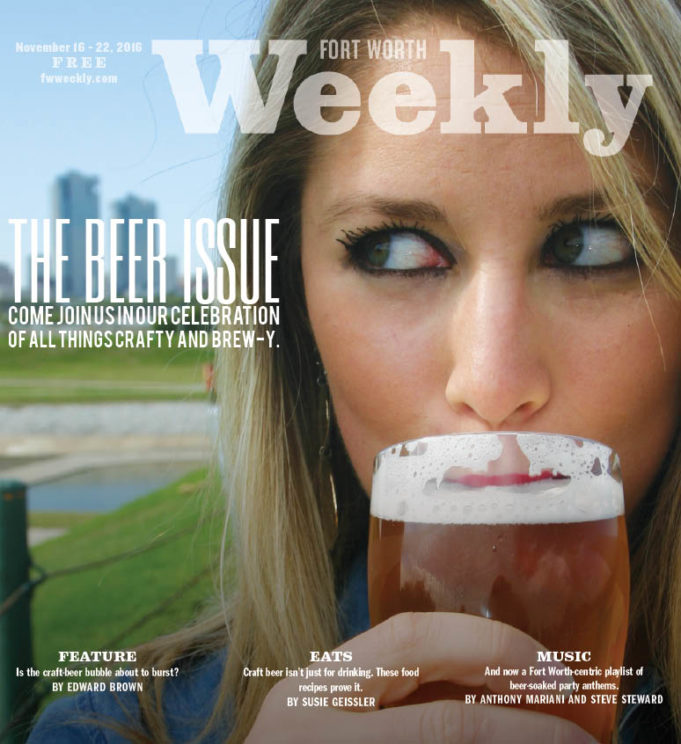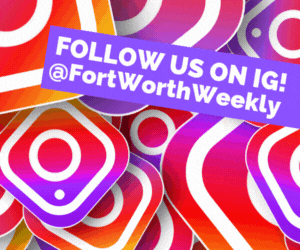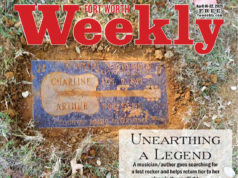Welcome to our inaugural beer issue. Arriving in the middle of North Texas Beer Week, a 10-day regional celebration of all things crafty and brew-y, our little tribute to Fort Worth’s burgeoning craft beer scene is full of all sorts of treats, from craft beer-infused food recipes to reviews of some of the event’s festivities so far — there’s even a (mostly) Fort Worth-local playlist of beer-soaked tunes in our Music section. As we have come to realize, craft beer isn’t some sort of fad. It appears to be a whole new way of life, with micro-economies exploding all around it and people devoting their life’s savings to it. Hopefully, our issue turns you on to some new suds or even new ways of thinking. Cheers! — Anthony Mariani
*****
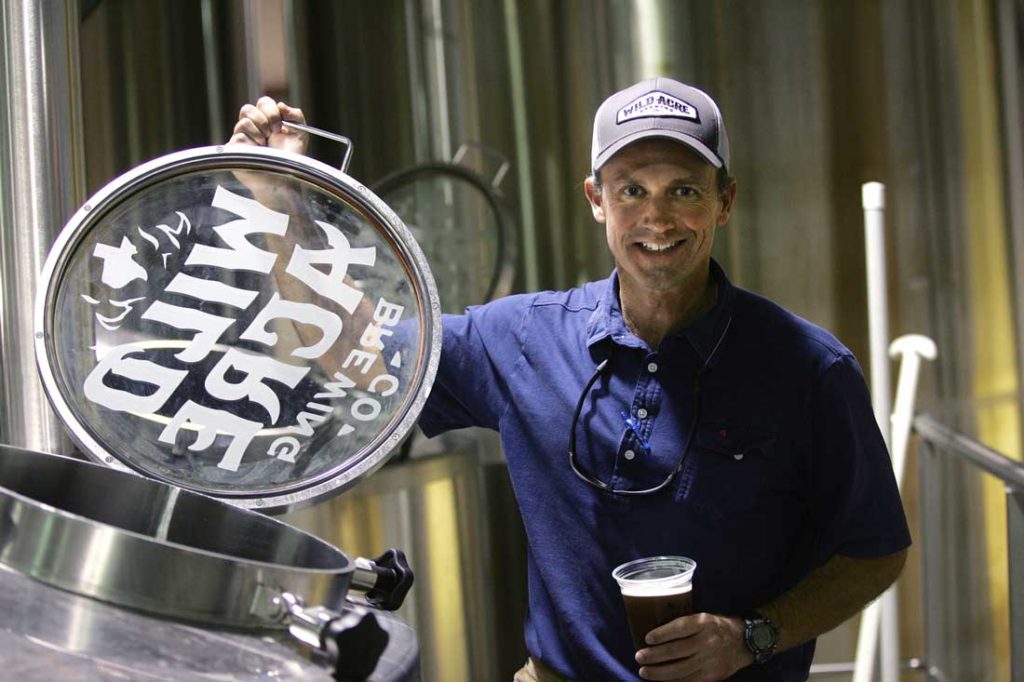
Wild Acre Brewing Company was, um, hopping. To celebrate the launch of North Texas Beer Week recently, the new brewery had thrown open its doors to the good fellas from The Hardline and to the people who enjoy/endure them. John Pritchett could barely catch his breath. The Wild Acre co-owner and cofounder was all over the place, greeting guests, manning the bar, and filling in wherever else his staff needed help. Apparently, there’s more to running a brewery than just kicking back and knockin’ them down Homer Simpson-style.
Pritchett, a long-time Fort Worthian, has watched our beer scene evolve from close up –– he was formerly an executive at Fort Worth-based Ben E. Keith Company, the fourth largest beverage distributor in the United States.
“There are many things that led to this growth,” he said. Over the past several years, “tons of great craft beers entered the Texas market from out of state.”
Another factor, he added, has been independent breweries’ access to distributors like Ben E. Keith and Dallas’ Andrews Distributing, which historically catered to macrobrews only.
“You have more Texas breweries where people can experience those beers,” he continued. “It’s like a snowball. It keeps getting bigger over time.”
The local beer market, he believes, is still young.
When asked what challenges new breweries will face in the coming years, Pritchett rattled off several factors, including public demand, retail space, and the success of craft beer-centric pubs.
The only brewpubs in town back in the day, he said, were the Flying Saucer Draught Emporium and later The Ginger Man.
“Now we have places like Central Market and Whole Foods selling craft beer, which is huge,” he said. “More and more often, restaurants are opening with multiple tap handles.”
Two years ago, I wrote a cover story about the Fort’s craft beer scene (“Our Pints Runneth Over,” Dec. 10, 2014). The Collective Brewing Project and Panther Island Brewing were just coming online, joining then-10-year-old Rahr & Sons Brewing Company and younger breweries and brewpubs like Martin House Brewing Company and Chimera Brewing Company.
The scene has grown since then. A lot.
A few miles west of Wild Acre’s gorgeous 28,000-square-foot facility near East Lancaster Avenue, HopFusion Ale Works recently began servicing bars and pubs with four ales. Established breweries and brewpubs are growing, their owners investing in larger fermentors and better brewing equipment. MillerCoors recently bought Granbury-based Revolver Brewing, which lets you know that even the big guys have their eyes on North Texas.
Arlington now boasts two independent breweries: Division Brewing and Legal Draught Beer Company. North Texas Beer Week is in its fourth year and has grown to include 250 events and dozens of independent breweries.
If the craft beer movement in Fort Worth has a middle child, it might well be Martin House. The Riverside-based brewery opened nearly four years ago, several years after Rahr & Sons but well ahead of the current bushel of Fort Worth breweries. When I stopped by to chat with Martin House co-founders Cody Martin, Adam Myers, and David Wedemeier, the large brewspace was bustling. Several staffers were manning a recently purchased canning line that was churning out enough Salty Lady to fill all of Central Market.
Martin House has built its reputation on bold beers that defy convention, like the salty, slightly tart ale I saw being canned ,or Kafkaesque, an imperial, smoked, black rye oaked IPA with raspberries.
“We’ve always been unconventional,” Martin said. “Admittedly, we started without an IPA, amber, or blonde. We started with a four-grain breakfast beer, a saison, and an imperial red. We’ve introduced stuff since then, but we always set out to be a little different.”
Four years ago, Martin, Myers, and Wedemeier were putting in a lot of overtime. Wedemeier recalled that period as “grueling.” Everything, from brewing to packaging, distribution, and sales, he said, had to be done without any employees. From the get-go, the co-owners developed a relationship with the community through building pop-up dog parks in the Near Southside and organizing bicycle races.
“The most amazing thing now is that we employ 19 people who make their living here and support their families here,” Martin said. “The side effect is that we don’t have to work every job now. We’ve all moved into the positions we want to be in.”
“It’s still pretty hands-on work,” Myers added.
The employees afford Martin more time for brewing. Martin House has a reputation for frequently releasing new brews. In the coming years, that will mean more barrel-aged varieties. Timing is just one of the challenges with the aging technique. The first batch of Martin House barrel-aged releases came out last summer.
“Releasing dark, heavy, high-alcohol beers during the summer wasn’t the best timing,” Martin said. “So we’re planning things out better for 2017 with our whiskey and wine barrels.”
“Is the Fort Worth market near the saturation point for craft beer?” I asked.
“I wouldn’t want to be starting a brewery now,” Martin said. “It was easy to get tap [space in bars] when we started, just because we were the new guys. That’s not really true anymore. There are so many new guys.”
Another diminishing resource, he added, is shelf space at retail stores.
“I think there’s a lot more room for Chimera-type places than for production breweries,” he said, referring to the foot traffic that drives Near Southside brewpubs like Chimera and The Collective Brewing Project.
Rabbit Hole Brewing co-founder and head brewer Matt Morriss was making test batches for his brewery’s third anniversary (Saturday, Dec. 10) when I called him recently. Even young breweries have traditions, and Morriss enjoys releasing special one-off beers on commemorative dates.
Rabbit Hole has roots in a Mineral Wells company. Famous for bottling locally sourced well water, Crazy Water has a big fan in NHL Hall of Famer and former Stars center Mike Modano, who preferred Crazy Water over sports drinks during games. A while back, Morriss, who was homebrewing at the time, was asked to make a 20-gallon batch of beer using Crazy Water. Modano, an investor in the water company, received a few bottles of the brew and loved it. When Morriss partnered with Tom Anderson and Laron Cheek to found Rabbit Hole, Modano agreed to invest in the venture. A grinning image of the superstar now adorns the brewery’s Kölsch.
In an ever more saturated North Texas beer market, Morriss and his team have looked west for new converts. The expansion is possible due to a mobile canning line that the brewery rents weekly.
Rabbit Hole beers are available in the “northern third of Texas,” he said. “We go all the way out to Amarillo, Lubbock, Wichita Falls, and Abilene. That allows us to branch out and serve people who might otherwise be in an underserved market.”
While North Texas is still the most lucrative market in the region, he said, Abilene, with its four colleges and Lubbock’s Texas Tech University, offers a unique opportunity for breweries.
These cities have “large student populations that move in and out,” Morriss said. “It’s a constantly rotating opportunity to get to newly minted 21-year-old beer drinkers who are looking for something different than what Dad drank.”
With new breweries coming online every month across North Texas, Morriss said he’s grateful to have a three-year head start. Being new brings throngs of curious hopheads at first, but the real test comes after the honeymoon with the media and fans ends.
One of those challenges, managing growth, is something Morriss and his team are constantly working on. Reaching new markets has the potential to strain the supply to existing accounts. Overproducing could backfire if demand for craft beer goes down. So far, that last scenario hasn’t happened. Fort Worth may be insulated from a craft beer surplus, Morriss said.
“In terms of brewery growth, I would say it hasn’t been as fast here as in Dallas,” he said. “Dallas has been a bit over aggressive, in my opinion, chasing perceived opportunities. I don’t think Fort Worth has been still so much as Dallas has been fast, almost faster than the market is able to absorb. Fort Worth has been rational in terms of being aware that the number of breweries coming online needs to match the market.”
Rahr & Sons recently celebrated its 12th anniversary. The award-winning Near Southside brewery now produces 20,000 barrels of premium suds per year. (One barrel holds 31 gallons.) When the brewery opened, the beer scene we now enjoy didn’t really exist. Today, Fort Worth is home to dozens of bars, brewpubs, and restaurants like The Bearded Lady and Pouring Glory Growler Fill Station that cater to craft beer fans. Outdoor events like Untapped Fort Worth and the Flying Saucer’s annual BeerFeast also have become an important part of this growth.
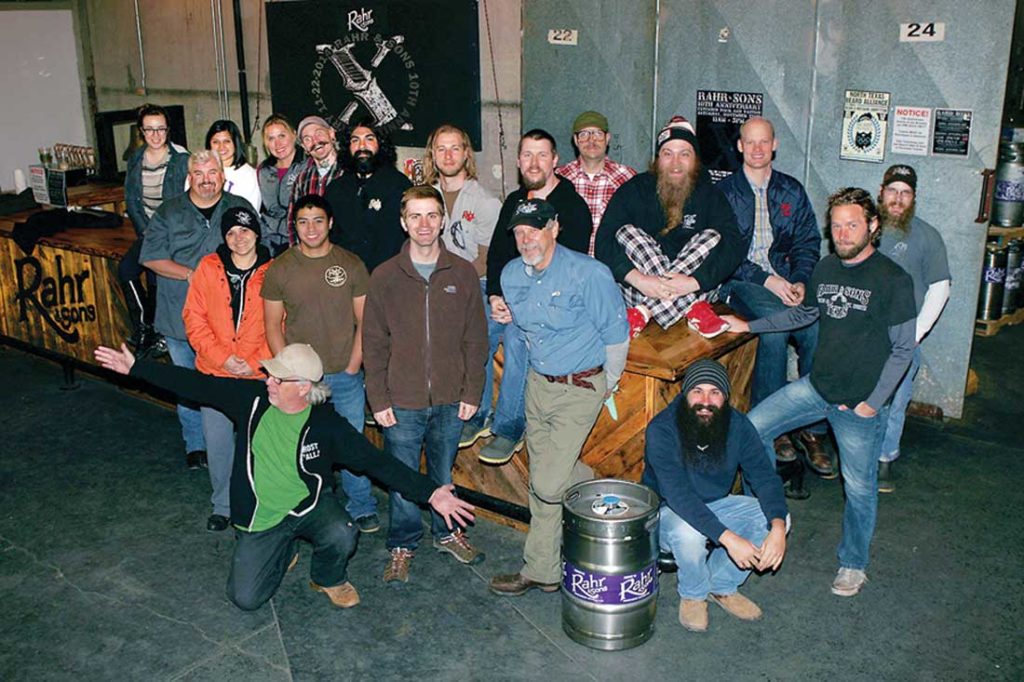
Rahr owner/founder Fritz Rahr said in a previous interview that those early years were a “real struggle.”
Craft beer, he told me, “was kind of an anomaly in North Texas at the time. It was pretty much a Budweiser/MillerCoors market then, plus a few imports. When we first went out, the local bars and restaurants were supportive, but they didn’t understand it at first. Everyone wanted to try something different, but there wasn’t this big craft beer buzz in the air, so it took some education in the market. Then around 2009, when there were just two or three of us [independent brewers] in North Texas, it was like the beer gods flipped the switch in North Texas, and it’s been nonstop ever since.”
The next addition to Fort Worth’s beer community may be Cowtown Brewing Company. Serving traditional Texas barbecue via Mansfield’s Big D Barbecue, this cavernous 5,200-square-foot brewpub just north of bustling East Belknap Street is a work in progress. One thing that may set Cowtown apart is a large outdoor deck and a stage for live music.
There have been setbacks, said co-owner and cofounder Shawn Kidwell. What helps, he added, is knowing that other people like him have gone through the same process successfully. Cowtown Brewing Company’s opening is set for late spring or early summer of 2017.
When it comes to talk of a craft beer bubble, economically speaking, Kidwell doesn’t see Fort Worth’s beer supply exceeding consumer demand anytime soon.
“We still have less breweries over here,” he said, referencing Dallas. “I’ve always been of the opinion that the more, the merrier. I know in a lot of industries, competition is a negative. With brewing, because of the market that we appeal to, folks like the variety. Part of the attraction of getting into this business is being able to solve the problems facing a new brewery while spending time doing what you love to do.”



